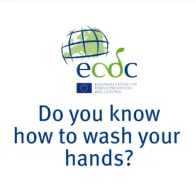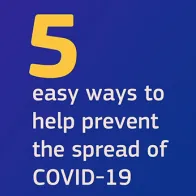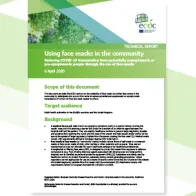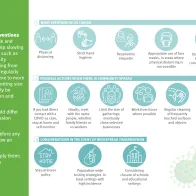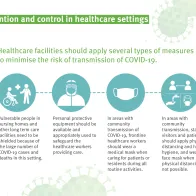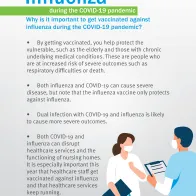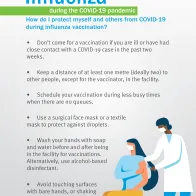Questions and answers on COVID-19: Prevention
1. How can I avoid SARS-CoV-2 infection?
To reduce your risk of developing SARS-CoV-2 infection:
- get vaccinated against COVID-19
- avoid large gatherings
- wear a mask in situations where physical distancing is not possible
- regularly wash and sanitise your hands
- open windows regularly, if possible, to improve ventilation.
The use of face masks in public indoor settings (e.g. supermarkets, shops and public transport) and in crowded outdoor situations is advised in areas with more COVID-19 cases and when physical distancing cannot be guaranteed.
The virus can enter the body via the nose, mouth and/or eyes, so individuals should avoid touching their faces with unwashed hands. Washing hands with soap and water for at least 20 seconds or cleaning hands thoroughly with alcohol-based solutions or gels, or disposable alcohol wipes, is recommended in all settings.
Good ventilation of indoor spaces through natural or mechanical means is an important measure to decrease the risk of infection. Avoid poorly ventilated, crowded spaces.
2. What should I do if I develop symptoms of COVID-19?
National public health authorities have specific guidelines for those who develop symptoms of COVID-19 (e.g. ‘call the local COVID-19 helpline’). Alternatively, local healthcare providers can be contacted for instructions.
Self-tests (such as rapid antigen tests, if used according to the manufacturer’s instructions) or laboratory-processed tests (such as PCR tests) can be used to test for SARS-CoV-2 to confirm whether the symptoms are indicative of COVID-19.
3. How can I avoid infecting others?
Anyone who develops symptoms compatible with COVID-19 should follow local recommendations for testing, isolation from others and medical care. Those with COVID-19 symptoms can also do the following to avoid infecting others:
- Cough or sneeze into your elbow or into a tissue (if you use a tissue, dispose of it carefully after a single use and wash your hands afterwards)
- Wear a face mask if you are in close contact with others (e.g. in a home setting) and if you visit closed public spaces or are in contact with vulnerable people, such as the elderly
- Practice physical distancing
- Practice proper hand hygiene and wash your hands regularly
- Avoiding touching your face, nose, eyes and mouth, and wash your hands thoroughly before and after doing so.
4. Are face masks effective in protecting against COVID-19?
The evidence for the use of medical face masks to protect against COVID-19 is limited, but increasing. Available evidence shows a small to moderate protective effect and that face masks may lower the risk of infecting others by decreasing the release of infectious particles during breathing and talking.
Therefore, face masks can be used together with other measures to decrease transmission of SARS-CoV-2.
Individuals can consider using a face mask when visiting busy, enclosed spaces where it is not possible to maintain sufficient physical distance from others, such as at grocery stores and shopping centres or when using public transport. ECDC recommends the use of medical face masks or respirators, if available, for individuals at increased risk of severe COVID-19 in these settings.
The use of face masks should not be a substitute for other recommended measures to prevent COVID-19 transmission, such as physical distancing, respiratory etiquette, hand hygiene, and avoiding touching the face, nose, eyes and mouth. The key to the effective use of face masks is to use them correctly and consistently.
5. What type of face mask should I wear?
The types of face masks that can be used include:
- medical face masks
- respirators
- community face coverings.
If community face coverings are used, they should comply with available guidelines for filtration efficacy and breathability.
Respirators (also known as FFP2 or N95 masks) may provide better protection compared with medical masks for the public, as properly fitted respirators provide better filtration.
6. Can the frequent use alcohol-based hand rub solutions or surface disinfectants cause the SARS-COV-2 virus to develop resistance similar to antibiotic resistance?
Antibiotics are substances that kill or inactivate bacteria in human or animal bodies. Antibiotics do not kill viruses, such as SARS-CoV-2, which causes COVID-19.
Alcohol-based hand rub solutions and surface disinfectants are substances that kill microorganisms (i.e. bacteria and viruses, including SARS-CoV-2, the virus that causes COVID-19) on the skin, objects or surfaces. Antibiotics have a different composition from alcohol-based hand rub solutions or surface disinfectants, and work differently.
Scientific studies and practical experience worldwide have shown that the use of alcohol-based hand rub solutions and surface disinfectants do not generally trigger resistance in viruses or bacteria.
Nevertheless, it is important to remember that alcohol-based hand rub solutions should only be used locally on skin and surface disinfectants should only be used on surfaces. Neither product should ever be ingested. Always follow the instructions from the manufacturer or public health authorities to avoid serious side effects.

